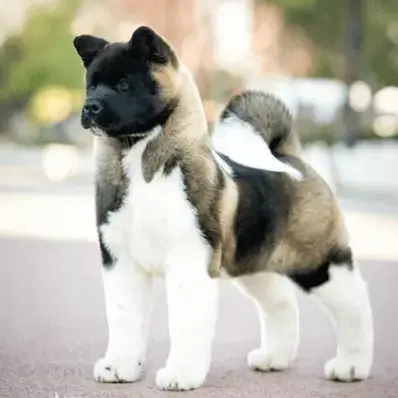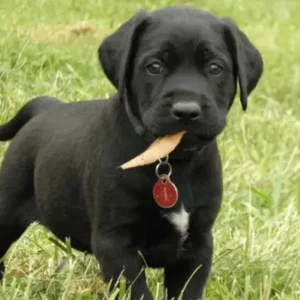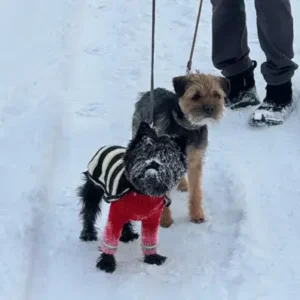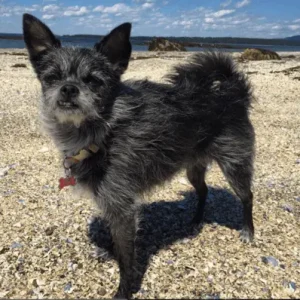Akita Chow History/Origin
The Akita Chow mix is a relatively new breed of dog, only coming into existence in the last few decades. However, the Akita and Chow Chow breeds have long run histories dating back centuries.
The Akita originates from Japan and was originally used for hunting bears and other large game during the late 1800s. In Japanese culture, the Akita is considered a symbol of good health, fortune, and luck. The Chow breed originated in China over 2,000 years ago and was used as a hunting dog, watchdog, and guard dog. Chows were also sometimes given as gifts to Chinese emperors.
The Akita Chow mix is said to have been first developed in Japan in the early 21st century, although the exact origins and dates are unknown. The Akita Chow was created by crossing the Akita with the Chow Chow. The resulting breed is an intelligent, loyal, and fearless dog that makes an excellent companion animal.
Here’s a quick look at the different characteristics Akita Chow dog gets from its parent breeds:
| Trait | Akita Chow | Akita | Chow Chow |
| Dog Breed | Mixed Breed | Purebred | Purebred |
| Temperament | Loyal, Protective | Loyal, Courageous | Aloof, Independent |
| Appearance | Robust, Dignified | Powerful, Sturdy | Lion-like Mane, Distinctive Appearance |
| Origins | Japanese, Chinese | Japanese Imperial Guard | Ancient Chinese Breed |
| Size | 23 to 25 inches | Large | Medium to Large |
| Coat Type/Color | Fawn, brown, black, red, or silver | Double Coat, Various Colors | Dense Double Coat, Various Colors |
| History | Japanese & Chinese History | Japanese Imperial Guard, Ancient Breed | Ancient Chinese Breed, Used for Hunting and Guarding |
| Socialization | Requires Early Socialization | Socialization is Crucial | Early Socialization is Important for Managing Independence |
| Trainability | Moderate to High | Moderate | Moderate to Difficult |
| Exercise Needs | Moderate to High | Moderate to High | Moderate to High |
The American Akita Chow Chow mix is registered at the Dog Registry of America.
Akita Chow Personality
The Akita Chow’s personality traits create a unique and complex character, blending independence, loyalty, and a touch of aloofness.
- Independent and Intelligent
The Akita Chow inherits a remarkable blend of independence and intelligence from both parent breeds. This hybrid is known for its ability to think independently and solve problems, making it a fascinating companion for those who appreciate a dog with a sharp mind.
- Loyal and Possessive
Loyalty is deeply ingrained in Akita Chow’s personality, a trait inherited from Akita’s parent. They form strong bonds with their family and are fiercely protective. However, this loyalty can sometimes translate into possessiveness, as they are devoted to those they hold dear.
- Aloof
Drawing from the Chow Chow’s temperament, the Akita Chow can exhibit an aloof nature. While they are devoted to their family, they may maintain a reserved demeanor, especially with strangers. This aloofness adds an intriguing layer to their personality, making them discerning and watchful.
They frequently exhibit dominant behavior and require consistent training to manage it. Proper socialization is crucial as their protective instincts may lead to aggression towards strangers.
Akita Chow Physical Appearance
Inheriting a strong and sturdy build from his parents, Akita Chow is considered to be a large dog.
- Size and Weight
Akita Chow dogs are large dogs, with an average dog weighing around 88 to 145 pounds, while an average Akita Chow puppy will weigh around 8 to 10 pounds.
They are also quite muscular, with a thick coat of fur that adds even more bulk to their already sizable frame. Regarding height, Akita Chow dogs typically stand between 24 and 28 inches tall at the shoulder.
- Coat and Color
As we mentioned, Akita Chow dogs have a thick, double coat of fur that helps protect them from the cold weather.
The outer layer of their coat is long and coarse, while the inner layer is short and soft. This combination helps keep them warm in the winter months and cool in the summer months.
Akita Chow dogs can be any color or combination of colors. However, the most common coat colors are black, white, brown, and red.
Black Akita Chow- Source: akita_pics
White Akita Chow -Source: Pinterest
rown Akita Chow – Source: Pinterest
Red Akita Chow – Source : Pinterest
The black Akita Chow dogs are popular for their thick, overall black coat. Usually, this breed has some shading or spots of colors mixed and a black Akita Chow mix is pretty rare.
Akita Chow Gender Differences
If you’re considering adding an Akita Chow to your family, you may wonder if there’s a difference between male and female Akitas.
So, let’s look at the gender differences of Akita Chows and see if one gender is better suited for your family members than the other.
- Size
Male Akita Chows are usually about 10% bigger than females. A male is probably your best bet if you’re looking for a big dog to fill a big space, with males typically weighing anywhere from 80 to 100 pounds and females weighing between 60 and 80 pounds.
However, a female Akita Chow might be a better fit if you live in a smaller home or apartment.
- Energy Levels
Generally, male dogs are more energetic than females. Females tend to be a little more relaxed and laid back than males.
This isn’t always the case with Akita chows, but it’s something to keep in mind if you’re looking for a laid-back dog who won’t need as much exercise.
- Temperament
Males can be more territorial and protective than females and are more likely to mark their territory with urine. If you have small children or other pets at home, you might want to consider getting a female Akita chow so that there’s less chance of aggression in your home.
Akita Chow Feed and Nutrition
To meet the dietary needs of the energetic Akita Chow, it is essential to provide a well-balanced diet tailored to their large size and high energy levels.
A nutrient-rich diet should contain essential proteins sourced from lean meats, poultry, and fish, promoting muscle development and immune system health. Adding healthy fats, such as fish oil and flaxseed, contributes to sustained energy and overall improved health.
Tomatoes for dogs can also be included in moderation, providing vitamins and antioxidants that support overall health. However, it’s important to remove the stems and leaves, as they can be toxic to dogs.
It’s crucial to adjust their diet options and portions based on factors like age, size, and activity level.
Akita Chow Health
Akita Chows may be prone to certain health issues inherited from their parent breeds. Here are some health conditions you should be on the lookout for:
- Entropion: Entropion in Akita Chows is a dog eye health issue where the eyelid rolls inward, causing eyelashes to rub against the cornea. This can lead to discomfort and potential corneal damage. Early identification through veterinary check-ups is crucial, and corrective surgery may be recommended for relief.
- Progressive Retinal Atrophy (PRA): A hereditary condition, Progressive Retinal Atrophy (PRA) affects the retinal cells of Akita Chows, gradually causing vision loss and, in severe cases, blindness. Routine eye examinations are essential for early detection, enabling proactive management strategies to slow down the progression of the disease.
- Hip Dysplasia: Common in larger breeds like Akita Chows, Hip Dysplasia involves improper hip joint development, leading to instability and potential arthritis. Maintaining a healthy weight, regular exercise, and veterinary monitoring are key for managing hip dysplasia. Early detection allows for interventions to enhance the dog’s comfort and mobility.
Regular veterinary check-ups are crucial for maintaining the overall well-being of Akita Chows and preventing any serious health concerns from escalating.
Akita Chow Care and Grooming
The Akita Chow Chow boasts a distinctive long, thick, straight, double coat, making grooming an essential aspect of their care routine.
As a heavy shedding dog, they may not be the top choice for allergy sufferers, but their coats are surprisingly manageable with regular attention.
To keep their coat in prime condition, brushing three to four times a week does the trick. This helps minimize shedding, prevents matting and tangles, and promotes a healthy, lustrous appearance.
While grooming is important, the Akita Chow also has high exercise needs. Regular physical activity, such as daily walks, jogs, or play sessions, is essential to keep them fit and prevent boredom.
This breed benefits from mentally stimulating activities as well, which can be integrated with dog training tips to reinforce obedience. Teaching commands or working on new skills during exercise can help manage their independent nature, making training sessions both productive and engaging.
Akita Chow Price
These dogs aren’t very common and the average Akita Chow price ranges between $1500 to $4000. You can find an Akita Chow mix puppy from these sources:
Akita Chow Rescue Group
If you’re looking to adopt an Akita Chow, you can check these rescue groups out:
Interesting Facts
- They also go by the name Chokita.
- They became popular in the United States after they arrived with the World War II soldiers who had served in Japan.
Best For
The Akita Chow is a great choice if you want a smart and watchful dog. They’re perfect for families with adults and people who like a calmer, more thoughtful canine friend.
Akita Chow Top Names
| Male Akita Chow Names | Female Akita Chow Names |
| Max | Luna |
| Rocky | Bella |
| Diesel | Daisy |
| Titan | Nala |
| Bentley | Chloe |
| Cody | Cleo |
| Bear | Zoey |
| Hunter | Mia |
| Zeus | Sadie |
| Duke | Sasha |









 Akita Chow- Source:
Akita Chow- Source:  Akita -Source :
Akita -Source : 

 Black Akita Chow- Source:
Black Akita Chow- Source:  White Akita Chow -Source:
White Akita Chow -Source:  rown Akita Chow – Source:
rown Akita Chow – Source:  Red Akita Chow – Source :
Red Akita Chow – Source : 







